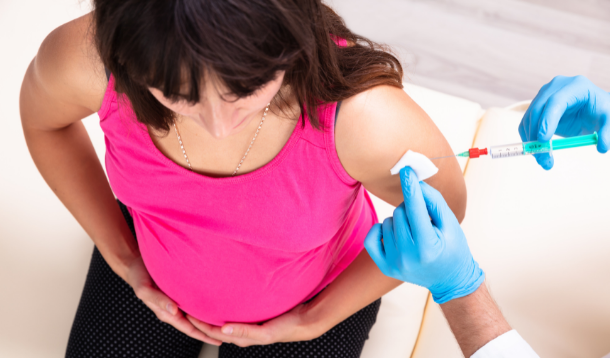
Many women across the world who are pregnant and/or breastfeeding are hesitant to receive a COVID-19 vaccine, and, Canadian women are no different.
While the Society of Obstetricians and Gynaecologists of Canada (SOGC) recently released a statement urging all provinces to prioritize COVID-19 vaccination for pregnant women and individuals across Canada, women are still reluctant to receive the vaccine.
Unlike the general population, pregnant and breastfeeding women weren’t included in the initial clinical trials for COVID-19 vaccines. Naturally, this makes some women feel apprehensive about the vaccine.
Luckily, more data is coming.
The Canadian government just announced two new studies to evaluate the safety and effectiveness of COVID-19 vaccines for pregnant and breastfeeding women, along with how they respond to the vaccines vs. those who don’t receive them. Together, these studies are receiving $1.3 million in federal funding. The goal of these studies is to give women and healthcare providers the data they need to make informed decisions on the COVID-19 vaccines.
According to Globe Newswire, both studies are being conducted as a partnership with the Canadian Vaccine Safety Network (CANVAS), a national platform that assesses vaccine safety during the implementation across Canada.
A national study, called COVERED, will be led by a team of researchers in British Columbia to monitor the attitudes, effectiveness, and safety of the various COVID-19 vaccines for those who are pregnant and lactating. Basically, it’s a COVID-19 vaccine registry for pregnant and breastfeeding women across Canada.
According to the study website, people from anywhere in Canada who have been pregnant during 2021 or are currently breastfeeding can register and be part of the vaccine studies. You don’t need to have received the vaccine yet or plan to in the future. (You can learn more about the COVERED study here).
Once enrolled, women will respond to a series of questions and modules on whether or not they've been vaccinated, if it was with one or two doses, if they’ve tested positive with COVID-19 before, and other questions.
"It is important that these data become available to pregnant and breastfeeding individuals so that they are able to make an informed choice about getting a COVID-19 vaccine," said Dr. Deborah Money, Professor in the Department of Obstetrics and Gynecology at the University of British Columbia and study lead researcher.
Dr. Money shared with the Toronto Star that over 4,000 women have already enrolled in this study and more can sign up.
The second study, based in Ontario, will focus on the health of women and their babies who received the COVID-19 vaccine while pregnant vs. women and babies who did not. It will use information from the Better Outcomes Registry & Network (BORN) in Ontario from December 2020 (after the COVID-19 vaccines were first available) and the vacation registry from the Ontario Ministry of Health (COVaxON) to analyze how mothers and their babies are doing.
This study is estimated to last for two years so women and healthcare providers can have access to long-term data.
"Although early evidence to date on COVID-19 vaccination in pregnant populations has not identified any safety concerns, it is critically important to monitor the health of these individuals and their babies following COVID-19 vaccination," said Dr. Scott Halperin, Co-Chair of the VSRG and Principal Investigator of the Canadian Research Immunization Network (CIRN).
Why we need these studies in Canada
Other countries have released preliminary data on how the vaccines affect pregnant and breastfeeding women, but these two new studies are the first of their kind in Canada.
A recent study in the United States of 35,691 pregnant women showed no obvious safety issues for those who received an mRNA COVID-19 vaccine (Pfizer–BioNTech or Moderna). The study, published in the New England Journal of Medicine, is ongoing but the initial data is positive for safety and effectiveness.
Another study from the U.S. looked at 131 women of reproductive age and found that babies born to vaccinated mothers had COVID-19 antibodies. The antibodies were present in breast milk samples and umbilical cord blood of the newborns.
However, there’s a need for studies to be done with the Canadian population as the U.S. and Canada have different healthcare systems, pregnancy outcomes, and populations.
“For instance, in the United States, they have slightly higher rates of preterm birth than we tend to have here in Canada. Just the whole dynamics of the pandemic itself are very different here," said Dr. Deshayne Fell, a lead researcher for the Ontario-based study, scientist at the CHEO Research Institute, and associate professor at the University of Ottawa, to the Toronto Star.
Hopefully, as we see data released from these two new studies in Canada, women will be more assured of the safety and effectiveness of COVID-19 vaccines for themselves and for their babies.